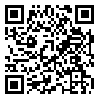مجله رویش روانشناسی از دادن گواهیهای کاغذی معذور است. لطفا تقاضا نکنید. همه گواهی ها در صفحه شخصی کاربران موجود است.
year 14, Issue 8 (atuomn 2025 2025)
Rooyesh 2025, 14(8): 99-108 |
Back to browse issues page
Download citation:
BibTeX | RIS | EndNote | Medlars | ProCite | Reference Manager | RefWorks
Send citation to:



BibTeX | RIS | EndNote | Medlars | ProCite | Reference Manager | RefWorks
Send citation to:
Golkar F, Bahrami Hidaji M, Kakavand A, Mansoobifar M, Zam F. (2025). Predicting Internet Addiction Based on Cognitive Flexibility and Practical Obsessions in High School Students. Rooyesh. 14(8), 99-108.
URL: http://frooyesh.ir/article-1-5945-en.html
URL: http://frooyesh.ir/article-1-5945-en.html
Farzaneh Golkar1 
 , Maryam Bahrami Hidaji2
, Maryam Bahrami Hidaji2 
 , Alireza Kakavand *3
, Alireza Kakavand *3 
 , Mohsen Mansoobifar2
, Mohsen Mansoobifar2 
 , Fatemeh Zam2
, Fatemeh Zam2 


 , Maryam Bahrami Hidaji2
, Maryam Bahrami Hidaji2 
 , Alireza Kakavand *3
, Alireza Kakavand *3 
 , Mohsen Mansoobifar2
, Mohsen Mansoobifar2 
 , Fatemeh Zam2
, Fatemeh Zam2 

1- PhD student in General Psychology, Department of Psychology, Karaj Branch, Islamic Azad University, Karaj, Iran.
2- Assistant Professor, Department of Psychology, Karaj Branch, Islamic Azad University, Karaj, Iran.
3- Associate Professor, Department of Psychology, Imam Khomeini International University, Qazvin, Iran. ,ar.kakavand@soc.ikiu.ac.ir
2- Assistant Professor, Department of Psychology, Karaj Branch, Islamic Azad University, Karaj, Iran.
3- Associate Professor, Department of Psychology, Imam Khomeini International University, Qazvin, Iran. ,
Abstract: (533 Views)
The present study aimed to predict Internet addiction based on cognitive flexibility and practical obsession in high school students. The research method was descriptive-correlational. The statistical population of this study comprised all high school students in Tehran for the academic year 2022-2023. The sample size was 200 people who were selected by convenience sampling. The instruments used were the Internet Addiction Test (IAT; Young, 1998), Cognitive Flexibility Index (CFI; Dennis et al., 2010), and Maudsley Obsessional-Compulsive Inventory (MOCI; Hodgson et al., 1977). Data analysis was performed using multiple regression analysis in the simultaneous method. The findings showed that alternative creation, control, alternative perception, checking, washing, slowness/repetition, and doubt can predict Internet addiction (p<0.05), and these variables explain 26.8% of the variance in Internet addiction in total. Therefore, given the significant relationship between cognitive flexibility and practical obsession with Internet addiction, therapists and counselors can move towards improving psychological flexibility and practical obsession to reduce students' Internet addiction.
Type of Article: Research |
Subject:
General Psychology
Received: 2025/01/14 | Accepted: 2025/02/1 | ePublished: 2025/11/1
Received: 2025/01/14 | Accepted: 2025/02/1 | ePublished: 2025/11/1
Send email to the article author
| Rights and permissions | |
 |
This work is licensed under a Creative Commons Attribution-NonCommercial 4.0 International License. |



